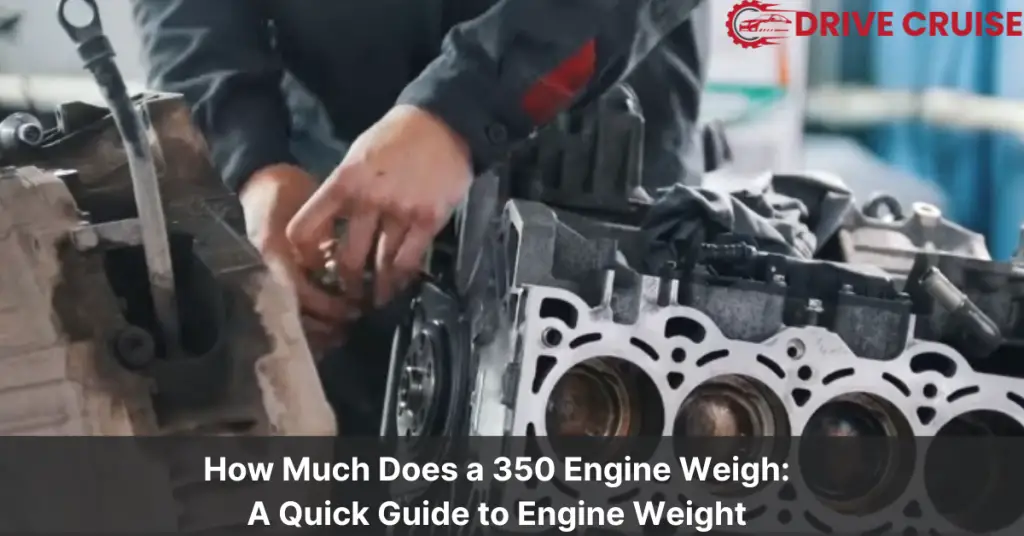If you’re looking for a powerful and versatile engine for your car or truck, the Chevy 350 engine is a popular option that has been used in a wide range of vehicles over the years. But before you start planning any modifications or swaps, it’s important to know how much this engine weighs. Understanding the weight of a 350 engine can help you determine the best way to optimize your vehicle’s performance, as well as estimate shipping costs and plan for any necessary modifications.
The weight of a Chevy 350 engine can vary depending on a number of factors, including the specific model, year, and any modifications or accessories that have been added. Generally speaking, the weight of a 350 engine can range from around 400 to 575 pounds. However, it’s important to note that different manufacturers may have their own versions of the 350 engine, which can affect the weight. For example, a Buick 350 engine may weigh around 450 pounds, while a Chevy small block 350 V8 for a Corvette may weigh around 535 pounds.
Understanding the weight of a 350 engine is important for a number of reasons. If you’re planning on making modifications to your vehicle, knowing the weight of the engine can help you determine the best way to optimize performance. Additionally, if you need to ship an engine, knowing the weight can help you estimate shipping costs and plan accordingly. Whether you’re a mechanic, car enthusiast, or just looking to learn more about engines, understanding the weight of a 350 engine is an important piece of knowledge to have.
Weight Variations: Why 350 Engines Don’t Have a Single Weight
If you’re wondering how much a Chevy 350 engine weighs, you might be surprised to know that there isn’t a single answer. The weight of a 350 engine can vary depending on several factors, including block material, attached components, and year and manufacturer variations.
Block Material: Iron vs. Aluminum
The most common variant of the Chevy 350 engine is the cast iron block. Cast iron is known for its durability, but it also contributes to a heavier weight. A typical weight range for a cast iron 350 engine block is between 175 and 200 pounds.
Less frequent but sought-after is the aluminum block. Aluminum is lighter than cast iron, which can help improve fuel efficiency and overall performance. A typical weight range for an aluminum 350 engine block is between 100 and 125 pounds.
Attached Components: Impacting the Overall Weight
The final weight of a 350 engine can vary depending on the components attached to it. Different cylinder head designs, such as aluminum vs. cast iron, can influence weight. The material variations in the intake manifold, such as aluminum vs. cast iron, can contribute to slight weight differences. Similarly, the exhaust manifolds or headers, with material choices like cast iron vs. stainless steel, can affect weight. Additional components like the oil pan, starter motor, and alternator can also add to the overall weight.
Year and Manufacturer Variations
There might be slight weight variations between 350 engines produced by different manufacturers, such as Chevrolet vs. GMC, or across various model years due to potential design changes. However, the weight differences are usually minimal and may not affect performance or efficiency.
Finding the Exact Weight of Your 350 Engine
If you’re wondering how much your 350 engine weighs, there are a few ways to obtain an accurate measurement. Here are some methods to consider:
Referencing Manufacturer Specifications
The best way to get an accurate weight for your 350 engine is to consult the original service manual or parts catalog for your specific engine. This will provide the most accurate information since it will account for the exact block material, year of manufacture, and any factory-installed components. Look for the engine’s specifications section, which should include the weight of the engine.
Identifying Engine Block Castings
Some engine blocks have casting numbers that can be decoded to identify the specific engine variant and potentially its weight range through online resources or manufacturer manuals. This can be helpful if you don’t have access to the original service manual or parts catalog. Look for the casting number on the engine block and use an online decoder to determine the engine’s specifications.
Weighing the Engine Yourself
If you have completely removed the engine from the vehicle, you can use a hoist and a heavy-duty scale to obtain the most precise weight measurement. However, keep in mind that this method is only feasible for completely disassembled engines outside the vehicle. Make sure to remove all components from the engine, including the flywheel, clutch, and transmission. Then, use a hoist to lift the engine and place it on a heavy-duty scale to obtain an accurate weight measurement.
Conclusion: Understanding Weight for Informed Decisions
Now that you have a better understanding of the weight of a Chevy 350 engine, you can make more informed decisions when it comes to your vehicle or project needs. As you have learned, the weight of a 350 engine can vary depending on several factors, including block material, attached components, and potential year/manufacturer differences.
It is important to note that the specific weight of your engine may differ from the average weight provided by the search results. Therefore, it is recommended that you consult your specific engine’s manual or use identification methods to determine the most accurate weight for your needs.
Understanding the weight of a 350 engine is crucial for various purposes, such as calculating vehicle weight distribution, estimating shipping costs, or planning engine swap projects (if applicable). By knowing the weight of your engine, you can ensure that your vehicle is balanced and safe to operate. Additionally, accurate weight information can help you estimate shipping costs and avoid any unnecessary fees or delays.
In conclusion, having a good understanding of the weight of a Chevy 350 engine is essential for any car enthusiast or professional in the automotive industry. By taking into account the various factors that influence engine weight and consulting accurate information, you can make informed decisions that will help you achieve your goals.
Related Posts:







